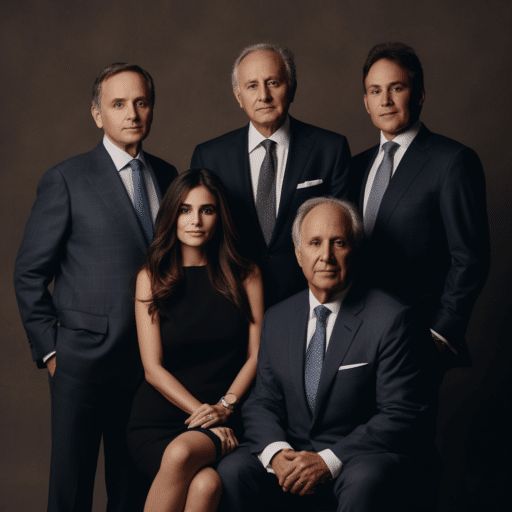Understand the differences between family office and holding company and choose the right structure for your wealth planning. This article centers around family office vs holding company. Read on to learn what they are and their differences.
The phrases “holding company” and “family office” are often used interchangeably with one another. Nevertheless, they are two separate and distinct entities.
If you want to invest as an expat or high-net-worth individual, which is what I specialize in, you can email me (advice@adamfayed.com) or use WhatsApp (+44-7393-450-837).

What Is A Family Office?
A family office is a specialized financial advisory firm that caters to individuals with a very high net worth, commonly referred to as ultra-high-net-worth individuals (HNWI).
Family offices distinguish themselves from conventional wealth management firms by providing a comprehensive approach to overseeing the financial and investment requirements of affluent individuals or families.
Family offices typically provide a range of services beyond financial planning and investment management. These may include insurance, tax services, budgeting, wealth transfer planning, charitable giving, and other related offerings.
A family office is a comprehensive wealth management solution that offers a diverse range of services customized to cater to the unique requirements of high net worth individuals (HNWIs).

Family offices are equipped to provide a range of specialized services to their clients, including investment management and guidance on charitable giving. These services are typically delivered by a team of experts who are dedicated to meeting the unique needs of each client.
In order to ensure a smooth transition of ownership and management within a family-run business, it may be necessary to establish structures for succession planning.
These structures could include trusts or a foundation to manage and protect the family’s assets. Clients facing complex situations may opt to engage the services of a family office to effectively manage their assets and ensure that their interests are aligned.
In addition to managing financial matters, a family office is equipped to handle a range of non-financial concerns, including but not limited to private education, travel logistics, and various household arrangements.
The term “family offices” generally refers to two types of entities: single-family offices and multi-family offices (MFOs).
Single-family offices are private wealth management firms that cater exclusively to the financial needs of a single ultra-high-net-worth family. Microfinance institutions (MFOs) exhibit a higher degree of similarity to conventional private wealth management practices.
Their strategy for business growth involves catering to a diverse range of clients.
The reason for the increased prevalence of MFOs is the ability to take advantage of economies of scale, which enables the sharing of costs among a larger group of clients.
It is worth noting that the functions and responsibilities of a family office can vary significantly. The reasons for seeking a family office may vary depending on the client’s specific requirements.
For instance, some clients may require a family office to access top-notch advice from a diverse team of experts, while others may need a family office to manage their day-to-day lifestyle needs.
What Are The Responsibilities Of A Family Office?
The task of offering guidance and assistance to extremely affluent families through a comprehensive wealth management strategy is a complex undertaking that cannot be handled by a single professional advisor.
Achieving success in this endeavor necessitates the concerted and synergistic contributions of a group of experts hailing from diverse fields such as insurance, law, inheritance, finance, taxation, and entrepreneurship.
A family office typically offers comprehensive financial planning services that are tailored to the unique needs of high-net-worth individuals and families.
This is accomplished through an integrated approach that takes into account various aspects of their financial situation.
Family offices provide a comprehensive suite of services that include asset management, risk management, cash management, lifestyle management, financial planning, and other related services. These services are designed to help clients effectively manage their wealth in a complex financial landscape.
✅ Legacy Planning And Management
Wealthy families who have spent their lives accumulating assets may face various challenges when attempting to optimize their legacy.
The challenges that one may face while planning their estate can comprise of high estate taxes, complex estate laws, and familial or business-related concerns.
To ensure a successful transfer of wealth, it is crucial to consider all aspects of the family’s assets.
This includes the transfer or management of business interests, estate planning, family trust management, philanthropic goals, and family governance. A comprehensive wealth transfer plan should address all of these areas.
Family offices collaborate with a team of advisors from various disciplines to ensure that the family’s wealth transfer plan is well-coordinated and optimized for its legacy.
✅ Lifestyle Management
In addition to managing financial matters, family offices often provide concierge services to assist families with their personal affairs and lifestyle needs.
The scope of this service may encompass a range of offerings such as performing comprehensive background checks on both personal and business staff, furnishing personal security measures for both home and travel, managing aircraft and yacht logistics, facilitating travel arrangements, and optimizing business operations.
✅ Investment Management
A family office can handle a range of financial responsibilities for a single family, including managing their investment portfolio, overseeing the purchase and sale of commercial real estate, managing the property, making private equity deals, investing in hedge funds, and investing in venture capital.

✅ Family Wealth Education
The primary responsibility of a family office is to impart knowledge to the younger generation of the family regarding the appropriate management of wealth and its utilization in accordance with the family’s values.
A family office can play a crucial role in cultivating a sense of responsibility and appreciation among future generations towards their wealth and the responsibilities that come with it.
Proper education on the subject can enable a family office to effectively preserve family harmony and mitigate conflicts arising from financial matters across different generations.
What Are The Types Of Family Offices?
There is a wide variety of family offices, and each one has a set of benefits and drawbacks that vary according to the requirements of the person or the family.
When selecting which kind is most appropriate for their specific circumstance, it is vital to take into consideration factors such as the clientele they serve, the size of their firm, and the organizational structure.
1️⃣ Traditional Family Office
A classic family office is an organization that was founded by a rich person to handle the money that was inherited by the family. It often employs a team of specialists that guard the money and help it develop.
A financial adviser, a tax expert, an estate planner, an accountant, and maybe, even more, might be on the team.
Since they are all employed by the family, there are no instances of potential conflicts of interest with regard to goods and services, as there would be if any of them worked for other financial institutions.
The primary goal is to attend to the stringent requirements of the financial interests of the family.
2️⃣ Single-Family Office (SFO)
It is essential for families with a very high net worth to have privacy standards and individualized wealth management. The reassurance that their economic choices would be adapted to their specific need should take precedence.
The establishment of a single-family office gives families the ability to place their faith in the fact that these problems will be handled appropriately and in secret.
A single-family office is more than simply financial planning; it covers a variety of services, including specialist tax and compliance regulation, as well as concierge services, such as real estate investment.
To guarantee that the family maintains complete authority over all aspects of decision-making, each of these offices is run by a dedicated staff that is chosen after discussions among family members.
The combination of all of these qualities creates the best possible wealth management choice for those looking for protection as well as individualized financial solutions.
A single-family office (SFO) often has greater operating expenditures than a multi-family office (MFO) and needs a large amount of cash to get started.
Some ultra-high-net-worth families decide to pool their assets and transform their open-ended investment vehicles (SFOs) into closed-end managed funds (MFOs) so that they may achieve the greatest possible savings.
3️⃣ Multi-Family Office (MFO)
UHNW families have access to additional wealth management options via the use of multi-family offices. In comparison to single-family offices, multi-family offices provide a considerable reduction in operating expenses, which is one of its most important advantages.
MFOs are able to provide their customers with the same comprehensive set of services at a considerably more affordable price by aggregating services across numerous households. MFOs occur in a variety of forms, such as commercial and private businesses, in addition to having cost structures that are cheaper.

Private or ‘closed’ MFOs serve a select group of families and split the expenses of running the organization among themselves. Commercial MFOs, on the other hand, are in business solely to generate profits from the provision of services to more than one family.
For ultra-high net worth families searching for complete wealth management solutions, this variety of alternatives enables enhanced financial freedom at the same time as the lowest overall financial pressure.
In the past, one of the most major disadvantages of having a multi-family office as opposed to a single-family office was that families did not have access to specialized wealth management services that were suited to their specific requirements.
However, many MFOs now provide individualized services and product solutions that are crafted to fulfill the specific needs of customers.
4️⃣ Outsourced Family Office
A family office that is outsourced is a practical alternative for busy people or families that want help in managing their money.
Instead of having to deal with different consultants and service providers, they are able to work together with a single organization that acts as a team on their behalf thanks to this form of family office.
The designated coordinator maintains a record of every communication and makes certain that every member of the team has access to the same information in order to provide effective service to customers.
In the end, anybody who is interested in simplifying their financial planning may find that contracting family office services out to a third party is the best option.
Family offices that are outsourced may provide many of the same services as conventional family offices and multi-family offices. These services include charitable planning and family wealth education.
The families have significantly less influence over the specialists that they engage with, despite the fact that these services are often less costly than those of a conventional family office.
5️⃣ Embedded Family Office (EFO)
Embedded family offices are a solution that is both cost-effective and convenient for families that want specialized wealth management services but do not want to incur the costs associated with establishing an independent family office.
An EFO is often part of a larger family corporation, and the top managers of the finance department at the parent company cater to the requirements of the EFO in terms of wealth management. However, it is possible for the border between assets held by the family and those controlled by the company to grow blurry as time goes on.
It’s possible that an EFO won’t be able to provide services that are up to par if there’s enough money. In the event that this does place, one possibility for outsourcing is to work with a multi-family office.

Who Works At A Family Office?
An rich family may have a need for a variety of services and, as a result, often employs the services of specialized specialists. The following are examples of some of these qualified professionals:
📌 Tax Advisors
Tax advisors are specialists that give customers with the necessary direction and advice to guarantee that their clients obtain the most beneficial tax treatments.
Because of their extensive knowledge and experience, they are often able to save their customers significant sums of money, sometimes even tens of millions of dollars.
📌 Investments and Wealth Mangers
Investments and Wealth Mangers are responsible for the financial well-being of their clients and provide a diverse selection of opportunities for the client’s money to be invested.
Large quantities of money may be invested in a variety of ways by these specialists, some of which include mutual funds and the creation of individualized strategies that are based on the requirements of each customer.
📌 Lawyers
Lawyers are very valuable resources since they provide vital advice and guidance on a variety of legal issues, including real estate, investments, trusts, estates, and maybe even criminal charges. When qualified attorneys relocate their office, they take extra care to safeguard their clients’ best interests in every step of the process.
Do You Need A Family Office: Things To Consider
To determine whether or not you would benefit from establishing a family office, you need to take into account a greater number of factors than simply your own wealth.
Considerations that need to be made include money, diversity, personnel, overhead, regional disparities, family dynamics, charitable interests, and time commitments.
The size and complexity of a person’s wealth, as well as the obligations that money places on a family, are factors that determine whether or not they need the assistance of a family office.
In certain cases, it could be necessary to have a number of different experts, or teams of specialists, who have access to high-value resources and are able to handle a lengthy list of significant concerns.
Those who have a net worth of around $250 million may choose to investigate the possibility of creating a conventional family office. Those who have a net worth of at least $30 million may want to consider the possibility of working in a multi-family office.
In general, individuals who have a total net worth of up to $50 million might receive the services and assistance they need from the advisers that they would find at a wealth management business.
An exhaustive analysis should be carried out before deciding whether or not a family office is the best option, as well as before selecting one of the major family offices. The following is a list of things that need your attention.
✅ Size Of Your Wealth
Before a conventional family office may be established, a family needs typically have a net worth that is more than one hundred million dollars.
The family’s ability to maintain a sustainable standard of living after meeting all of their lifestyle requirements is the single most crucial factor in assessing whether or not a family office should be established.
In the event that the family office does not generate enough additional returns to meet its operating expenses, the business can be remodeled into a private equity company.
✅ The Complicated Nature of Investment Portfolios
When a family’s assets and estate plans grow too extensive for one person to handle alone and too complicated to control and arrange, establishing a family office can be the best alternative available.
This makes it possible to increase financial returns, as well as to monitor and supervise activities in a more effective manner, to coordinate activities throughout the family, and to provide integrated support for long-term continuity.
The greatest estate plans consist of straightforward wills and remaining trusts that don’t call for any interpretation after the primary asset has been distributed.
It is possible that the estate will need the assistance of professional employees in order to execute and carry out the desires of the estate’s founders throughout the course of numerous generations if it contains various legal companies or trust structures.
✅ The Dynamics Of Your Family
A family office may be beneficial to families that want to manage their money and pass it down to future generations. It can also give flexibility and improve communication within the family.
A family office may offer parents with the opportunity to include their adult children in the decision-making process about the organization of their money and to provide those children jobs within the family company.
Because of this, every person is able to keep themselves informed and up-to-date on any changes or developments made to the portfolio, and open lines of communication are made available to ensure that everyone is aware of what is occurring with their assets.
✅ Time And Material Resources
When it comes to the management of one’s money, having a family office on hand may be of tremendous assistance to anybody.
You will be able to devote more of your time and energy to other essential facets of your life if you hire a professional team to handle some of the decision-making and asset management responsibilities for you.
Those who have a significant amount of money may benefit from having access to a knowledgeable team that can give professional counsel and direction in order to improve their chances of making prudent and accurate choices about their finances.
It is possible to verify that all investing operations are in compliance with the appropriate legislation by delegating these jobs to trained specialists.

What Is A Holding Company?
A holding company is a kind of legal organization that operates as a business, often taking the form of a corporation or a limited liability company (LLC).
Generally speaking, a holding corporation is not permitted to produce anything, sell any goods or services, or engage in any other kind of commercial activities. Holding firms, on the other hand, are the entities that own the majority of the voting shares in other businesses.
Although a holding company is the owner of the assets of other firms, it often only acts in a supervisory capacity for other businesses.
Therefore, although it may have oversight over the management choices made by the firm, it does not actively engage in the day-to-day operations of the businesses that are its subsidiaries.
Holding companies are also referred to as “umbrella” companies or parent companies in various contexts.
The primary reason for a holding company’s existence is often to provide the function of acting as a controlling shareholder in other businesses. Holding firms are able to acquire a wide variety of assets, including real estate, patents, trademarks, stocks, and even other types of businesses.
This structure has the purpose of reducing the holding company’s (as well as the different subsidiaries under its control) exposure to financial and legal responsibility risks. It is also possible for a firm to reduce its total tax obligation by strategically placing specific elements of its operations in countries that offer lower tax rates.
“Wholly-owned subsidiaries” are another name for businesses that are owned by their parent holding corporation in their whole.
Although a holding company has the ability to employ and dismiss the management of the firms it owns, the managers themselves are ultimately accountable for the companies’ own operations.
What Are The Pros And Cons Of A Holding Company?
Pros Of A Holding Company
Holding companies are able to safeguard themselves from potential losses. In the event of a subsidiary company’s bankruptcy, the holding company may incur a capital loss and a reduction in its net worth.
The creditors of the insolvent firm are not legally authorized to seek compensation from the holding company.

As a means of safeguarding its assets, a parent corporation may opt to organize itself as a holding company and establish separate subsidiaries for each of its various business lines.
As an instance, it is possible that a subsidiary of a parent corporation may possess the brand name and trademarks of the parent company, whereas another subsidiary may possess the real estate assets.
Establishing or modifying holding companies is a comparatively straightforward process. The strategy described here involves leveraging geographical variations in taxation policies.
For instance, if a particular region imposes steep business taxes, a holding company can opt to shift its operations to a more tax-friendly location while still maintaining its original business activities. This approach can help companies optimize their tax liabilities and improve their bottom line.
Holding companies provide assistance to their subsidiaries by leveraging their resources to reduce the expenses associated with obtaining operating capital. A downstream guarantee allows the parent company to provide a loan guarantee on behalf of its subsidiary.
Cons Of A Holding Company
There are a few drawbacks associated with having ownership of subsidiaries via a holding company.
When it comes to the holding company’s overall financial health, it may be difficult for investors and creditors to get an accurate picture of the company’s situation.
It is also conceivable for directors who lack ethical standards to conceal their losses by transferring debt among their several companies.
Holding corporations have the ability to exploit their subsidiaries by coercing the subsidiaries to choose directors of the holding company’s choosing or by compelling the subsidiaries to purchase goods from one another at prices that are higher than the current market price.
They could even compel subsidiaries to sell goods to one another at prices lower than those found on the market.
In some circumstances, holding corporations have the power to compel its subsidiaries to terminate the employment of a significant portion of their staff or to pillage their acquisitions for assets that may be sold.
These tactics, which are often referred to as “vulture capitalism,” have the potential to inflate the overall figures of the parent company at the cost of the subsidiary.
Family Office Vs Holding Company: The Differences
It is common practice to use the words “holding company” and “family office” interchangeably. On the other hand, they are two separate entities.
An ultra-high-net-worth person or family may benefit from the comprehensive and complete balance sheet management that is offered by a family office.
On the other hand, a holding corporation is nothing more than a collection of stock shares in different businesses. Comparable to the functioning of family offices.
The purpose of many holding corporations is to make it simple to invest in new company opportunities as they appear. On the other hand, in contrast to a family office, a holding corporation does not provide the same degree of hands-on management.
Final Thoughts
A holding company is a special kind of corporate corporation that exists only for the purpose of acquiring ownership interests in other businesses.
Some holding corporations are enormous conglomerates that have operations in a wide variety of business sectors, while others just exist to oversee the operations of a single subsidiary.
Holding corporations are a useful tool for a number of reasons, including the protection of its owners from financial losses and the reduction of their tax obligations.
On the other hand, a family office is often founded by persons who have a very large net worth for a number of distinct reasons.
A family office’s first and primary responsibility is to oversee the management and expansion of the family’s wealth.
In addition to this, it is necessary for the organization to provide a comprehensive range of other services that are geared at assisting families in managing the complexity and requirements that come along with having significant wealth.
It’s possible that some of the world’s wealthiest families and individuals may benefit from using the services of a family office, but the vast majority of those with significant wealth would be better off working with the experts at a wealth advice business.
Pained by financial indecision?

Adam is an internationally recognised author on financial matters with over 830million answer views on Quora, a widely sold book on Amazon, and a contributor on Forbes.



